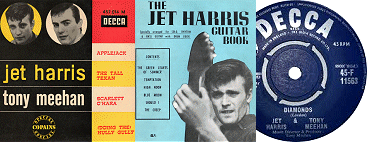Sixties
City presents
a wide-ranging series of
articles on all aspects of the Sixties, penned by the creator of the iconic
60s music paper Mersey
Beat
|
Sixties
City presents
a wide-ranging series of
articles on all aspects of the Sixties, penned by the creator of the iconic
60s music paper Mersey
Beat
|
|||||
|
| Jet
Harris was born Terence Harris in Kingsbury, North-West London on 6th July
1939. He was noted as one of the fastest sprinters at Dudden Hill Secondary
Modern School, for which he earned the nickname 'Jet'. After leaving school
at the age of 15 he was inspired to become a musician, made his own double
bass and taught himself how to play. He joined a backing group for Larry
Page and then toured with Tony Crombie and The Rockets - it was Crombie
who provided him with an electric Framus
bass guitar, one of the first in Britain. At various times he played with Terry Dene's Aces and Wee Willie Harris, joined The Vipers skiffle group (with whom he made his first recordings) and followed this by backing The Most Brothers. Jet was originally the bass guitarist with Cliff Richard's backing group The Drifters and, when it was discovered that there was an established American group of that name, it was Harris who suggested they call themselves The Shadows. During his spell with the group he appeared on a number of their hit instrumentals, including 'Apache', 'Man Of Mystery', 'FBI', 'Frightened City', 'Kon Tiki' and 'Wonderful Land'. In 1962 Harris left the group to embark on a solo career and hit the charts with 'Besame Mucho' and 'Main Title from The Man with the Golden Arm'. The following year he teamed up with another former Shadows member, Tony Meehan, and the duo topped the chart with Jerry Lordan's 'Diamonds', following up with 'Scarlett O'Hara' and 'Applejack'. That year he was voted Top Instrumentalist in a New Musical Express Poll. Harris was then involved in the car crash that changed his life. He and his girlfriend, pop singer Billie Davis, were badly hurt when their chauffeur-driven car was in a collision with a bus. Harris suffered head injuries. Of the crash, he was to comment, "It happened only a few hours after I had been voted Britain's Top Instrumentalist. It shook me terribly, I became a physical wreck and it's no secret I turned to the bottle - or rather, two bottles of vodka a day." Harris then went missing and was spotted at a wrestling match in Brighton. He was seen in court frequently over the years. In 1963 he appeared before the Brighton magistrates on a charge of being drunk and disorderly. Two years later he appeared before the Marylebone magistrates, accused of driving whilst drunk. He was fined and disqualified from driving for two years. By that time Harris was living in Portsea Hall in Paddington, West London.
|
| Other jobs
he has undertaken over the years include working as a hospital porter, a
trawlerman, a cockle-seller, a restaurant chef and a window cleaner. In
1996 Harris went to Bournemouth to see a show by Hank B. Marvin. He went
into the bar and met the caterer, Janet, who became his fourth wife. He was also given a lot of help by Barry Gibson, managing director of Burns, the London guitar makers, who arranged for Jet to travel to Milan to see psychologist Amadeo Maffi. Harris said that the treatments had a remarkable effect. He gave up drinking and began living in a flat in Gloucester with Janet, a partner 20 years his junior. He already had four children by his previous marriages and Janet had three. Jet Harris now performed with his own band, The Diamonds, and also made guest appearances with Local Heroes, whose other members included former Shadows members Alan Jones and Cliff Hall, along with former Tornadoes drummer Clem Cattini. Jet was diagnosed with cancer in 2009 and was awarded the MBE for his services to music in 2010. He died on 18th March 2011. |

|
|
Article
Text
UK
web hosting by
|